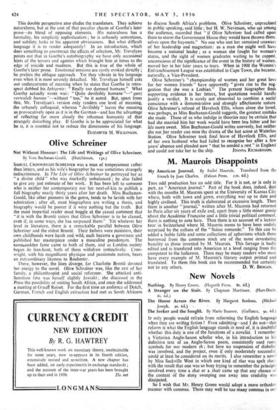Olive Schreiner
SAMUEL CRONWRIGHT-SCHREINER was a man of temperament rather than letters, and as his wife's biographer he was sometimes strangely indiscriminate. In The Life of Olive Schreiner he portrayed her as " a divine child " who was markedly unbalanced ; he also failed to give any just estimate of her work. It has been left to someone who is neither her contemporary nor her next-of-kin to publish a full biography nearly thirty years after her death. Miss Buchanan- Gould, like other pioneers in the genre, tends to be lavish with her admiration ; after all, most biographers are writing a thesis, and biography would be poorer if it were nothing but the truth. But the most impartial reader must boggle at the casual comment that " it is with the Brontë sisters that Olive Schreiner is to be classed, even if, in some ways, she has surpassed them." Yet whatever her level in literature, there is a remarkable parallel between Olive Schreiner and the eldest Brontë. Their fathers were .ministers, their own childhoods were harsh and wild, each became a governess and published her masterpiece under a masculine pseudonym. The same.sudden fame came to both of them, and as London society began its lion-hunt, both of them withdrew instinctively. Cron- wright, with his magnificent physique and passionate nature, bears an extraordinary likeness to Rochester.
There, however, the lines diverge, for Charlotte Brontë devoted her energy to the novel. Olive Schreiner was, like the rest of her family, a philanthropist and social reformer. She attacked anti- Semitism (she was herself slightly Jewish) ; she discussed in the Press the possibility of uniting South Africa, and once she addressed a meeting at Graaff Reinet. For the first time an audience of Dutch, German, French and English extraction had met as South Africans
to discuss South Africa's problems. Olive Schreiner, unpractised in public speaking,. said little ; but H. W. Nevinson, who sat among the audience, recorded that " if Olive Schreiner had called upon them to storm the Government House they would have thrown them- selves upon the bayonets." No one who met her remained unaware of her leadership and magnetism: as a man she might well have become a national leader ; as a woman she fought for woman's status, and the sight of women graduates waiting to be capped, unconscious of the significance of the event in the history of women. moved her in her later years to tears. When in 1908 the Women's Enfranchisement 'League was established in Cape Town, she became, naturally, a Vice-President.
Olive Schreiner's " championship of women and her great love for her women friends " have apparently " given rise to the sug- gestion that she was a Lesbian." The present biographer finds supporting evidence in her letters, but quotations would hardly justify a verdict. It is surely not abnormal to combine a social conscience with a demonstrative and strongly affectionate nature. Olive Schreiner's refusal of Havelock Ellis, whom alone she loved, was perhaps, as Miss Buchanan-Gould suggests, the greatest mistake she made. Those of us who indulge in theories may be certain that had she married him her work would have been less bitter and her life more sweet. Miss Buchanan-Gould writes unevenly, but neither she nor jier reader can miss the drama of the last scene at Waterloo Station. Olive Schreiner took final leave of Havelock Ellis, and of her own husband who had failed to recognise her after a few years' absence and pleaded now " that he needed a rest " in England
and could not take her to the ship. JOANNA RICHARDSON.






































 Previous page
Previous page